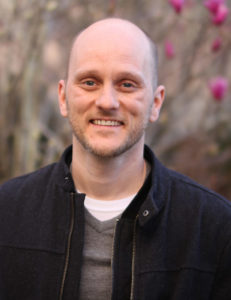PROFILE: Jeremiah Leroy, Sustainability Officer, Buncombe Co., NC

Jeremiah Leroy
Sustainability Officer
Buncombe Co., NC
Jeremiah LeRoy became the Sustainability Officer for Buncombe County in 2017, bringing with him to the job a wealth of experience in finance, tax, and IT departments. He has worked for the county government for over 1o years. After starting work as the Sustainability Officer for Buncombe County, SSDN came recommended from a friend as a great resource. Jeremiah has been a member of SSDN since the spring of 2017, kicking off his membership by attending the annual meeting in Durham in May.
Why SSDN?
SSDN has been a great network of peers with which I can talk about these pressing issues I am facing. Specifically, he has been working with Laurel Creech in Nashville and having conversations about what they’re doing there.
He says, “Passing ideas around and sharing resources is hugely helpful and important, it gives me an idea about how it’s gone so far for others. All of this is so new, and I’m learning everyday. I’m working on a certification for energy management, trying to grasp a whole new language and acronyms. The network is a great resource to ask questions and gain expertise.”
What have you been working on ?
The county is responsible for the school systems, and that’s where a large part of the budget goes. Therefore, our three to five year plan includes improvement projects and energy audits for facilities, like schools. In the next year we will be working on the Buncombe County Clean Energy Fund, as well as a community funding process. Through this, 40 to 50 nonprofits are funded directly to work on sustainability initiatives. There is a vested interest in their sustainability and achieving energy efficiency. Another project that we’ve been working on is a low income weatherization program modeled off of Knoxville, Tennessee. Being able to use ideas from a neighbor’s plan, and learn from their processes to adapt to the Asheville area is invaluable.
What make sustainability in your area unique?
Sustainability is a broad word, and in Buncombe county it mostly relates to energy. We’ve already been tracking and managing facilities and exceeding carbon reduction goals. The next focus for this area is external, looking to partners that can help make an impact on the community. What makes this county really unique is the community-wide support they get for sustainability efforts. This can be more challenging in rural areas but the enthusiasm far exceeds the average in the southeast.
What are you most excited about?
Negotiating solar farm on our old landfill, which is a county-led project. It will be a four to five megawatt system, and the plan is to lease the land to a company that will manage the solar farm and that company will sell energy back to Duke Energy. The county gets money from leasing the land and everyone benefits from it having access to renewable energy – it’s a win-win.
What is one thing people should know about you?
My biggest strength is my adaptability. I have worked in multiple departments and areas. I’m flexible to learn new things and take on new projects.